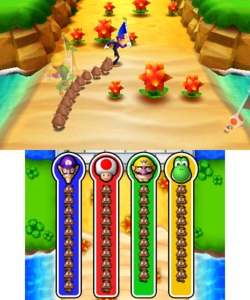Goomba to Maneuver: Difference between revisions
m (→Names in other languages: typo) |
No edit summary |
||
| Line 12: | Line 12: | ||
==Gameplay== | ==Gameplay== | ||
The player must direct | The player must direct their ten Goombas to the end of a course filled with [[thorny flower]]s. The Touch Screen displays the number of Goombas each player currently has. If a Goomba touches one of the thorny flowers, it will disappear; if any Goombas were behind the one that disappeared, they will speed up to catch-up. If the player touches any of the flowers, they will be stunned and sent backwards, though they do not lose a point. As they progress along the course, more flowers and ones larger in size appear. If at anytime the player loses all their Goombas, their game ends automatically, and they receive 4th place. The player who has the most Goombas after all four reach the finish line wins. | ||
==Ending== | ==Ending== | ||
When a player reaches the goal or loses all their Goombas, the word "Finish!" will be given to them, though they must wait until everyone finishes. This is the only minigame in which "Finish!" is given independently for each player, rather than for all players. | When a player reaches the goal or loses all their Goombas, the word "Finish!" will be given to them, though they must wait until everyone finishes. This is the only minigame in which "Finish!" is given independently for each player, rather than for all players. | ||
Once all four players reach the goal, the screen fades to black then to the scene where all characters are shown. | Once all four players reach the goal, the screen fades to black then to the scene where all characters are shown. Any player with the most Goombas does a success animation, and any player with the fewest Goombas does a failure animation; although multiple characters can do their failure animations if they tie for last place, they are not placed 4th unless at least two players lose all their Goombas. | ||
If | If no one is able to lead any Goombas to the finish, the minigame ends in a tie, although the victory music still plays. | ||
==Controls== | ==Controls== | ||
Revision as of 01:29, December 19, 2022
| Goomba to Maneuver | |
|---|---|

| |
| Appears in | Mario Party: Island Tour |
| Type | General minigame |
| Time limit | N/A |
| Music track | Let's Keep Going |
Goomba to Maneuver (Tour and Simple in the British English version) is a General minigame from Mario Party: Island Tour. The American name is a pun on the phrase "room to maneuver," while the British name is a pun on the phrase "pure and simple."
Introduction
The player is seen coming in from the bottom of the top screen holding a flag with their color, and ten Goombas are seen following their steps. The minigame then begins.
Gameplay
The player must direct their ten Goombas to the end of a course filled with thorny flowers. The Touch Screen displays the number of Goombas each player currently has. If a Goomba touches one of the thorny flowers, it will disappear; if any Goombas were behind the one that disappeared, they will speed up to catch-up. If the player touches any of the flowers, they will be stunned and sent backwards, though they do not lose a point. As they progress along the course, more flowers and ones larger in size appear. If at anytime the player loses all their Goombas, their game ends automatically, and they receive 4th place. The player who has the most Goombas after all four reach the finish line wins.
Ending
When a player reaches the goal or loses all their Goombas, the word "Finish!" will be given to them, though they must wait until everyone finishes. This is the only minigame in which "Finish!" is given independently for each player, rather than for all players.
Once all four players reach the goal, the screen fades to black then to the scene where all characters are shown. Any player with the most Goombas does a success animation, and any player with the fewest Goombas does a failure animation; although multiple characters can do their failure animations if they tie for last place, they are not placed 4th unless at least two players lose all their Goombas.
If no one is able to lead any Goombas to the finish, the minigame ends in a tie, although the victory music still plays.
Controls
left or right – Move
In-game text
- Rules – American English "Avoid the obstacles, and lead as many Goombas to the finish line as possible."
- Rules – British English "Get as many Goombas to the finish line as possible without leading them into the thorny flowers."
Names in other languages
| Language | Name | Meaning | Notes |
|---|---|---|---|
| Japanese | クリボーをつれてって[?] Kuribō o tsurete tte |
Take a Goomba | |
| Dutch | Goomba-gids[?] | Goomba Guide | |
| German | Gumba-Polonaise[?] | Goomba Polonaise | |
| Italian | Fila goombiana[?] | Goomba'd queue | |
| Portuguese | Em Fila Indiana[?] | In Single Queue | |
| Russian | Проворный проводник[?] Provorniy provodnik |
Agile guide | |
| Spanish (NOA) | ¡Sigan al líder![?] | Follow the Leader! | |
| Spanish (NOE) | En fila Goomba[?] | In a Goomba line (pun on "en fila india", meaning "in a single line") |